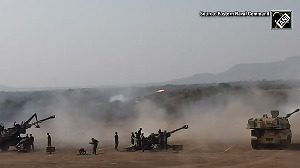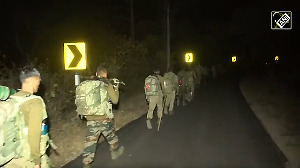 It is important to protect fissile material from extremists in Pakistan more than nuclear bombs because the latter has multi-layer security unlike the former, a senior Pakistani nuclear expert said on Saturday.
It is important to protect fissile material from extremists in Pakistan more than nuclear bombs because the latter has multi-layer security unlike the former, a senior Pakistani nuclear expert said on Saturday.
Pervez Hoodbhoy, a professor of Physics and Mathematics at Forman Christian College University in Lahore, said there was no need of India and Pakistan to test the nuclear bomb in 1998 as both knew the capacity of the atomic weapon they possessed.
Speaking about the threat of extremists to nuclear warheads in Pakistan, Hoodbhoy said, "Even if Taliban or other extremists organisations can get the weapons, which is not impossible, the nuclear weapons have several locks and passwords. I hope Pakistani weapons too have the Permissible Action Limit (PALs) to ensure the security of weapons.
"But it is the fissile material which should be protected. However, to make a bomb out of it one requires 80-90 kgs of enriched uranium. However, even in this case, it will be very primitive," he said.
Hoodbhoy was delivering a lecture on future of India-Pakistan relations and Prime Minister Narendra Modi's visit's impact on it. The lecture was organised by Centre for Policy Analysis.
Noting that testing of atomic bomb by any nation is for sending "political messages", he said it could have been avoided.
"India could have avoided testing the (nuclear) bomb. Pakistan too could have avoided not responding to it. It is fairly simple matter to understand the magnitude. The amount of material and purity of material and the core of the uranium bomb. Any PhD Student would have estimated the yield of the bomb.
"Testing of fission bombs is done for sending a political message... the way North Korea does by testing fission bombs," he said.
India and Pakistan both being nuclear weapon states affects the security atmosphere in the region, owing to the uneasy relations between the two. It is estimated that Pakistan has 120-130 nuclear war heads while India has around 100-110 atomic weapons.
Hoodbhoy said Pakistan's nuclear doctrine is to counter India's nuclear weapons.
Commenting on the current state of Indo-Pak relations, Hoodbhoy said both nations have shown "maturity" after the Pathankot attacks.
"Unlike 26/11 Mumbai attacks in 2008, it is a good thing that when India pointed out that these attackers were from Pakistan, it did not deny that. Otherwise it would have been disgraceful," he said.
The scientist, however, noted that a lot needs to be done and "not enough action" is being taken against outfits like Jaish-e-Mohammed and LeT and finances to these organisations are still not being tracked.
He said with Gen Raheel Sharif, the chief of Pakistan Army, at the helm, there has been decisive action against terrorists.











 © 2025
© 2025